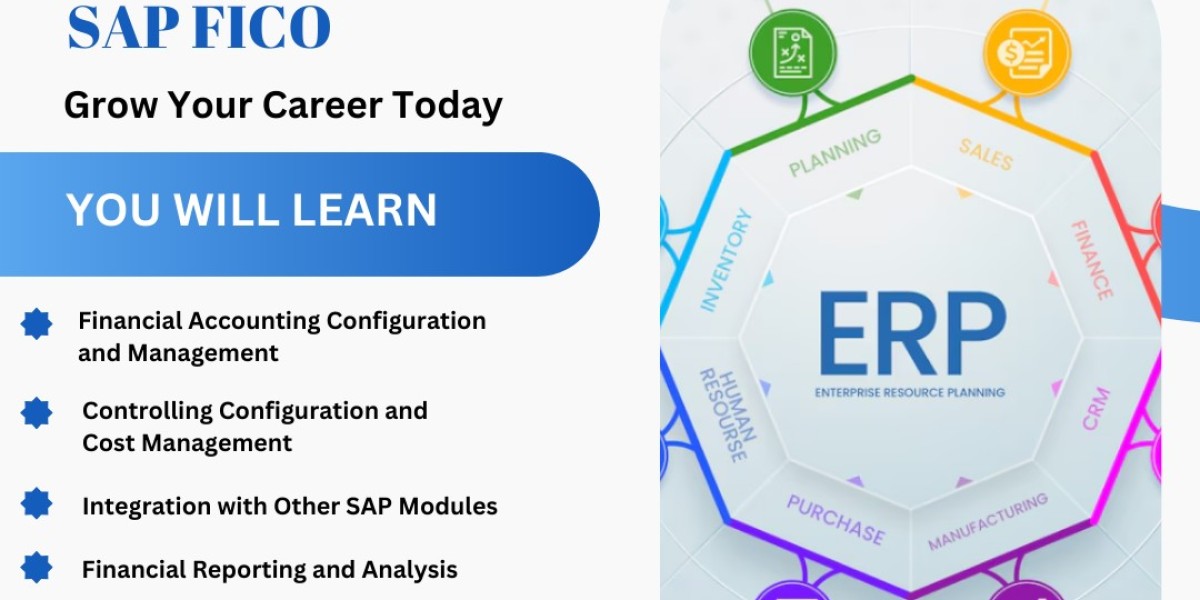In the dynamic world of finance and accounting, proficiency in SAP FICO (Financial Accounting and Controlling) is increasingly becoming a prerequisite for professionals aiming to excel in their careers. The SAP FICO course syllabus is meticulously designed to equip students with the necessary skills and knowledge to tackle real-world challenges effectively. This blog will delve into how the SAP FICO course syllabus prepares you for practical applications in the workplace, ensuring you are well-prepared for the demands of the industry.
Understanding SAP FICO
Before diving into the course syllabus, it's essential to understand what SAP FICO entails. SAP FICO is a core module within the SAP ERP system that integrates financial accounting and controlling processes. It enables organizations to manage their financial transactions, reporting, and compliance efficiently. As businesses increasingly adopt SAP solutions, the demand for skilled professionals who can navigate the complexities of SAP FICO has surged. A well-structured SAP FICO course syllabus is crucial for developing the competencies required in this field.
Key Components of the SAP FICO Course Syllabus
The SAP FICO course syllabus typically encompasses several key components that are vital for understanding and applying the concepts in real-world scenarios. Here are some of the critical areas covered in the syllabus:
- Introduction to SAP FICO
The course begins with an overview of SAP FICO, its importance in the SAP ecosystem, and its integration with other SAP modules. This foundational knowledge is essential for understanding how financial data flows within an organization and how it impacts decision-making.
- Financial Accounting (FI)
The financial accounting component of the syllabus covers essential topics such as:
- General Ledger Accounting: Understanding the structure and functionality of the general ledger, including posting transactions and managing accounts.
- Accounts Payable (AP): Learning how to manage vendor transactions, process invoices, and handle payments.
- Accounts Receivable (AR): Gaining insights into customer transactions, invoicing, and collections.
- Asset Accounting: Understanding how to manage fixed assets, including acquisition, depreciation, and retirement.
This comprehensive coverage ensures that students are well-versed in the fundamental aspects of financial accounting, preparing them for real-world financial management tasks.
- Controlling (CO)
The controlling component of the syllabus focuses on internal reporting and cost management. Key topics include:
- Cost Center Accounting: Learning how to track and analyze costs associated with different departments or functions within an organization.
- Profit Center Accounting: Understanding how to evaluate the profitability of different business units or product lines.
- Internal Orders: Gaining insights into managing costs related to specific projects or activities.
By mastering these concepts, students can contribute to effective budgeting, forecasting, and performance analysis in their future roles.
- Integration with Other Modules
A significant advantage of the SAP FICO course syllabus is its emphasis on integration with other SAP modules, such as SAP MM (Materials Management) and SAP SD (Sales and Distribution). Understanding how financial data interacts with procurement and sales processes is crucial for effective decision-making. This integration prepares students to work collaboratively across departments, enhancing their ability to address complex business challenges.
- Reporting and Analytics
The syllabus also covers reporting tools and techniques within SAP FICO, enabling students to generate financial statements, management reports, and analytical insights. Proficiency in reporting is essential for making informed business decisions and meeting regulatory requirements. By learning how to leverage SAP's reporting capabilities, students are better equipped to provide valuable insights to management.
- Real-World Case Studies and Scenarios
One of the most effective ways the SAP FICO course syllabus prepares students for real-world challenges is through the inclusion of case studies and practical scenarios. These real-world applications allow students to apply their theoretical knowledge to practical situations, enhancing their problem-solving skills. By working through case studies, students learn how to navigate complex financial issues, make data-driven decisions, and develop strategic solutions.
Hands-On Training and Practical Experience
In addition to the theoretical components of the SAP FICO course syllabus, hands-on training is a critical aspect of the learning experience. Many institutes incorporate practical exercises, simulations, and projects that allow students to work directly with SAP software. This hands-on experience is invaluable for several reasons:
- Familiarity with the Software: Gaining practical experience with SAP FICO software helps students become comfortable navigating the system, which is essential for their future roles.
- Application of Knowledge: Hands-on training allows students to apply the concepts learned in the classroom to real-world scenarios, reinforcing their understanding and retention of the material.
- Problem-Solving Skills: Working on practical exercises encourages students to think critically and develop problem-solving skills, which are essential for addressing challenges in the workplace.
Industry-Relevant Skills Development
The SAP FICO course syllabus is designed to align with industry standards and best practices. By covering the latest trends and developments in financial management and accounting, the syllabus ensures that students are equipped with the skills that employers seek. Some of the industry-relevant skills developed through the course include:
- Financial Analysis: Students learn how to analyze financial data, identify trends, and make recommendations for improvement.
- Regulatory Compliance: Understanding compliance requirements and regulations is crucial for financial professionals. The syllabus covers relevant laws and standards, preparing students to navigate compliance challenges.
- Communication Skills: Effective communication is vital for conveying financial information to stakeholders. The course emphasizes the importance of clear and concise reporting, enabling students to present their findings effectively.
Career Opportunities After Completing the SAP FICO Course
Completing an SAP FICO course opens up a wide range of career opportunities in finance and accounting. Graduates can pursue roles such as:
- SAP FICO Consultant: Working with organizations to implement and optimize SAP FICO solutions.
- Financial Analyst: Analyzing financial data and providing insights to support decision-making.
- Cost Accountant: Managing and analyzing costs to improve profitability.
- Controller: Overseeing financial reporting and compliance within an organization.
The skills gained from the SAP FICO course syllabus prepare graduates to excel in these roles and contribute to their organizations' success.
Read Our Daily Blog: https://connectingdotserp.in/which-are-the-top-career-opportunities-after-sap-fico-course-in-2024/
Conclusion
In conclusion, the SAP FICO course syllabus is meticulously designed to prepare students for real-world challenges in finance and accounting. By covering essential topics such as financial accounting, controlling, integration with other modules, reporting, and practical applications, the syllabus equips students with the knowledge and skills needed to succeed in their careers. The emphasis on hands-on training and industry-relevant skills development further enhances graduates' employability and effectiveness in the workplace.
As you consider your options for professional development in SAP, you may also want to explore other modules, such as the SAP MM course in Pune, which focuses on materials management. Diversifying your skill set can further enhance your career prospects and make you a well-rounded professional in the SAP ecosystem.







